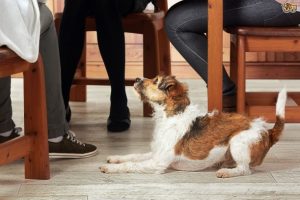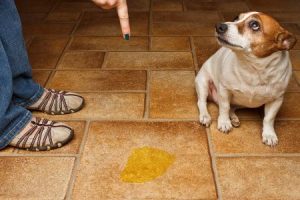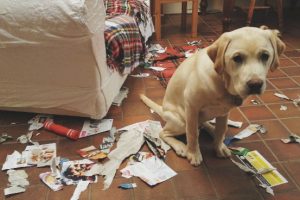We often get questions about how to deal with dogs begging for food or jumping up the kitchen table and helping themselves to our food, and many customers ask about methods to deal with destructive chewing. However, before we get into how to deal with these two issues, we must step back and understand why dogs behave in this manner, and what got them to be this way.
many customers ask about methods to deal with destructive chewing. However, before we get into how to deal with these two issues, we must step back and understand why dogs behave in this manner, and what got them to be this way.
Begging & Dog Behavior:
First and foremost, we must understand that dog (and for that matter even cats) do not use the same logic which humans use. Every behavior or action by your pet that you translate into “human like” emotions or logic is caused by something totally different to the way we humans see things.
Dogs live in the now … not the past and certainly have no concept of the future. Dogs live in the moment and if you do not believe this just watch your dog’s behavior objectively and you will see that a dog that has a disagreement or fight with another dog in the same household will 5 minutes later start playing with or cuddling up to the other dog as though nothing happened. Dogs do not carry grudges, seek revenge, or look for payback. A fight that breaks out between two dogs, even in the same household, is nothing more than typical pack behavior routed in the principles of alpha male or female.
For example, let us say you are trying to house train your puppy/dog and you arrive home to find that your dog has done its business on the  carpet. Taking your dog to the spot where he soiled the carpet and tell it off, or putting its nose into it and getting angry does not register in the dog’s mind as human logic would suggest. The only thing your dog will understand is that you are angry at the presence of urine or poop … not his urine and poop, but any urine or poop! Since dogs live only in the moment, they do not associate your anger or telling-off with what they did a while back – they only associate the anger with the presence of excrement. Only if you catch your dog in the process of doing their business in the house and then displaying displeasure, would they associate the act with the reaction.
carpet. Taking your dog to the spot where he soiled the carpet and tell it off, or putting its nose into it and getting angry does not register in the dog’s mind as human logic would suggest. The only thing your dog will understand is that you are angry at the presence of urine or poop … not his urine and poop, but any urine or poop! Since dogs live only in the moment, they do not associate your anger or telling-off with what they did a while back – they only associate the anger with the presence of excrement. Only if you catch your dog in the process of doing their business in the house and then displaying displeasure, would they associate the act with the reaction.
This principle applies exactly in the same manner to the subject of food. If you pass some food items or snacks to your dog that is laying on the floor next to you while you are having a meal, the dog associates your “dining” with it getting a food reward. To the dog it means when you have food on the table it means you will eat and that you will most certainly feed it. The dog also associates more directly that food on the table is also his food. Therefore in order to stop your dog food begging you must create a new pattern of behavior by following the advice below consistently (there is no such thing as “one time off” or “special occasion” that justifies breaking the pattern).
- Feed your dog before your have your meal if that is also the scheduled time for their feeding. Do this using the dog’s usual food (dry, wet, or home cooked) and in the dog’s feeding bowl – away from your kitchen or dining table, and away from where you usually eat. As a norm, the dog’s feeding bowl must always be in a place that is safe and quiet but away from where human food is served. If you usually have the feeding bowl in your kitchen, then locate it always in a spot furthest from the table using for eating, and the kitchen counters where you have your food.
- NEVER give your dog any food that you are consuming at the time – never is the key word here. I know some human logic says “poor dog, look at those sad eyes…” or “I feel terrible eating while he is staring at me” …etc. But remember this is human logic … dogs don’t think that way, they only associate with patterns not human emotions.
- If your dog whines, barks, jumps up while you are eating then firmly say “No” and make it clear that you are not happy with that behavior. Don’t shout, just say no in a firm and calm voice while making eye contact with your dog. If he has jumped up to your knees or the table, say “No” while at the same time pushing the dog firmly (not forcefully) away. By repeating this consistently, your dog will associate the new pattern as the way to behave and the wining, barking, and jumping will stop. Yet, if you make one exception to these rules, your dog will relapse into the old behavior because they do not understand the human concept of “just this one time”.

Destructive Chewing:
Now let us turn to destructive chewing. Dogs chew for several natural reasons which vary depending on the age of the dog. Puppies for example, chew because the discomfort of losing their baby teeth encourages them to chew on objects to reduce the discomfort. Older dogs chew out of boredom, frustration, anxiety, and in rare cases due to a medical reason such as gum or mouth infections. Remember. Chewing for a dog is a natural instinct and there is nothing wrong with it as such – it is the habit of destructive chewing which we are talking about here.
- If you have a puppy,the first thing to do is to “puppy proof” your house. This means removing any cleaning supplies, chemicals, detergents, indoor-plant (which may be extremely harmful to pets if ingested) …etc.- anything that may pose a serious risk to your puppy if chewed and ingested.
- Provide your puppy/dog with safe chewing toys (I do not recommend cowhide or natural bones, and certainly no plastic toys which can easily be torn and ingested) – Nylabone or Kong are reasonably safe but your puppy/dog must be supervised while playing with them.
- Exercise your puppy/dog and play with them regularly during the day. The biggest reason for chewing is boredom and frustration, therefore exercise and playtime will vent your dog’s play-energy and boredom. Ensure your exercise level and length is proportionate to the age, size, breed, and natural characteristics of your dog.
- If you find your puppy/dog has chewed something (your shoes, the leg of a chair, a carpet …etc.) but you have not caught the dog in the act, then simply remove the item and make sure it goes on the list of items of “puppy/dog proofing your home”. Telling off your dog will only register to it as “I get told off when there is a mess, … or when wood pieces are on the floor, … or when carpet pieces are laying around” … remember the dog’s logic will not associate its past-action with the telling off.
- If however, you catch your dog in the act of chewing on a household item or a personal effect, immediately and calmly remove the item from the dog’s mouth and firmly say “NO” and display displeasure in facial and body gestures; Then immediately fetch the dog’s chew toy and give it to them. When the dog starts playing with it and chewing on it, just say “Good Dog” and display pleasure in facial expression. By repeating this every time you catch your dog chewing you will condition the dog’s behavior.
- If you notice that your adult dog has unusually started chewing on things, do consult with your veterinarian to rule out mouth or gum infections, or any other possible medical reason for the sudden change in behavior.
Most important to remember is your dog/puppy has a process and their begging for food or chewing is a learned behavior, which you can un-teach by providing consistent routines and suitable alternatives. When in doubt always consult with a professional dog behaviorist and trainer who can shed some light on canine logic and how to deal with a particular problem.
